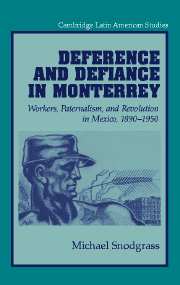Book contents
- Frontmatter
- Contents
- Acknowledgments
- Introduction
- 1 Porfirian Progress in “Mexico's Chicago”
- 2 Revolution Comes to Monterrey
- 3 Work, Gender, and Paternalism at the Cuauhtémoc Brewery
- 4 Making Steel and Forging Men at the Fundidora
- 5 The Democratic Principles of Our Revolution: Labor Movements and Labor Law in the 1920s
- 6 Every Class Has Its Leaders: ASARCO, The Great Depression, and Popular Protest in Monterrey
- 7 Stay with the Company or Go with the Reds
- 8 State Your Position!: Conservatives, Communists, and Cardenismo
- 9 The Quotas of Power: Organized Labor and the Politics of Consensus
- 10 The Persistence of Paternalism
- 11 The Institutionalized Revolution
- Select Bibliography of Primary Sources
- Index
6 - Every Class Has Its Leaders: ASARCO, The Great Depression, and Popular Protest in Monterrey
Published online by Cambridge University Press: 19 August 2009
- Frontmatter
- Contents
- Acknowledgments
- Introduction
- 1 Porfirian Progress in “Mexico's Chicago”
- 2 Revolution Comes to Monterrey
- 3 Work, Gender, and Paternalism at the Cuauhtémoc Brewery
- 4 Making Steel and Forging Men at the Fundidora
- 5 The Democratic Principles of Our Revolution: Labor Movements and Labor Law in the 1920s
- 6 Every Class Has Its Leaders: ASARCO, The Great Depression, and Popular Protest in Monterrey
- 7 Stay with the Company or Go with the Reds
- 8 State Your Position!: Conservatives, Communists, and Cardenismo
- 9 The Quotas of Power: Organized Labor and the Politics of Consensus
- 10 The Persistence of Paternalism
- 11 The Institutionalized Revolution
- Select Bibliography of Primary Sources
- Index
Summary
Early on the morning of May 24, 1932 – just as social unrest reached its peak in Depression-era Monterrey – 240 workers barricaded themselves inside the ASARCO smelter. As news of their sit-down strike spread, hundreds of strike supporters gathered outside the plant's gates. Present were the smeltermen's wives and children, unemployed workers, and residents of the surrounding neighborhood. ASARCO's workers struck as they did – in defiant violation of the labor law – to force management to sign a collective contract with their union. The action culminated a violent season of labor protests and hunger marches in the streets of Monterrey. As an alarmed public would have read in the press, Communists directed both the demonstrations and the ASARCO union. The sit-down strikers held firm as authorities beseeched them to exit the smelter. Late in the afternoon, the president ordered federal troops and mounted police to the scene. Faced with the threat of military intervention, the workers exited from the smelter. As they did, a skirmish broke out between police and union sympathizers. The ensuing melee left one worker dead and dozens of men, women, and children injured. Further protests were silenced by a military occupation of downtown Monterrey. The ASARCO strike ended in tragic defeat. But it symbolized a visible transformation of working-class attitudes and behavior in the industrial regions of Mexico.
- Type
- Chapter
- Information
- Deference and Defiance in MonterreyWorkers, Paternalism, and Revolution in Mexico, 1890–1950, pp. 145 - 165Publisher: Cambridge University PressPrint publication year: 2003



